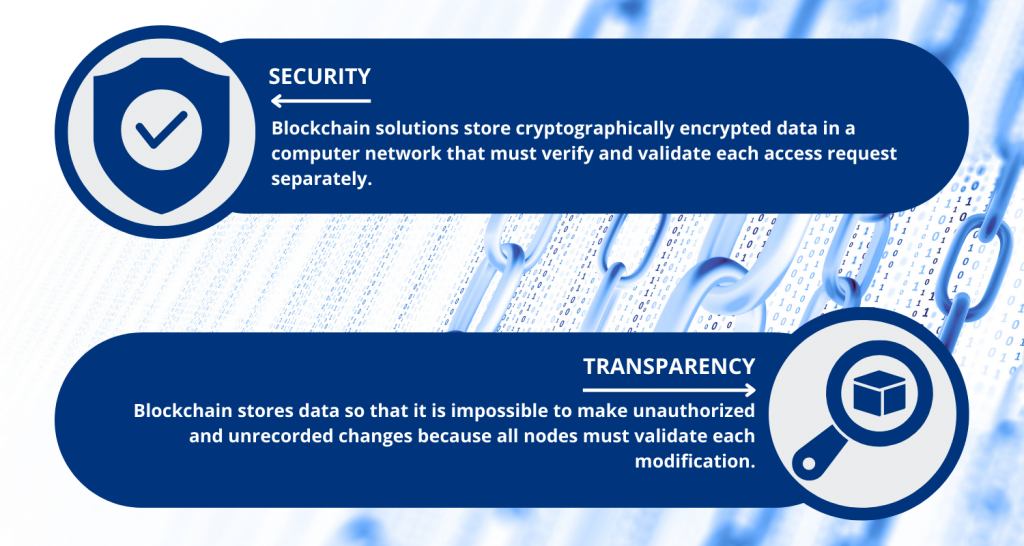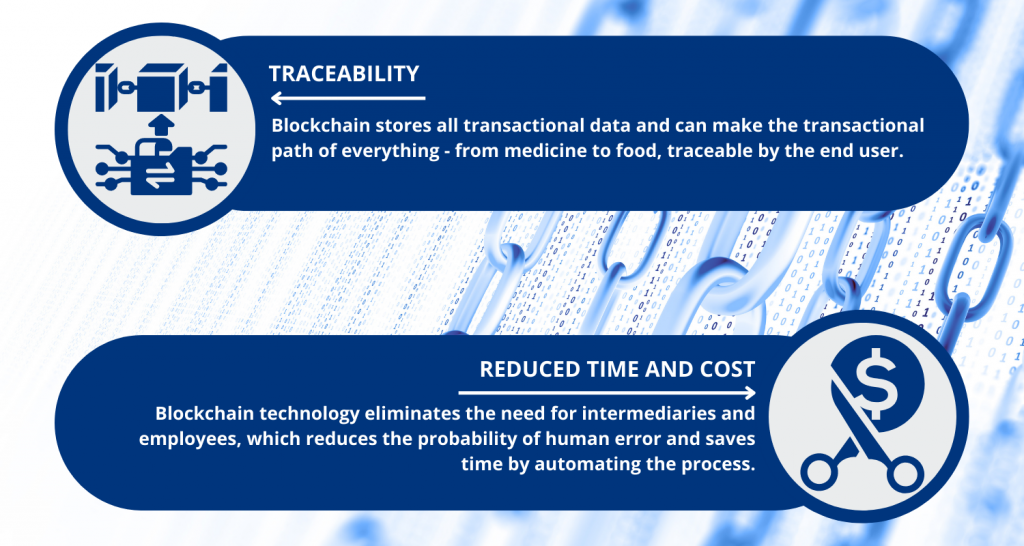The benefits of blockchain technology extend far beyond speculative cryptocurrency trading and bitcoin going “to the moon.” While more testing and refinement of the technology are needed, blockchain use cases are snowballing, and soon we will see more of it enter our daily lives. Today we will look at four significant benefits of blockchain and how they can improve business, commerce, and software.
Security
Our world is under constant threat of cyberattacks: hacks against banks have resulted in the theft of millions of dollars across the globe. In 2021, Ireland’s healthcare system suffered a ransomware attack, which crippled the county’s hospitals and cost a reported $600 million to recover. According to HealthcareIT News, more than 40 million patient records have been compromised in incidents in 2021. Leading cybersecurity firms forecast this is just the tip of the iceberg for cybercrime.
Blockchain technology can offer companies an alternative method to store their data, offering more protection against data breaches. How? Traditionally, data is recorded on a central server (which is vulnerable to attacks). Blockchain solutions store cryptographically encrypted data across a network of computers that must check and validate each access request separately. Unless cybercriminals can hack into every node in the system, the data will not be accessible to them. This process of encryption and validation also means that data cannot be changed after it has been stored, unless all of the nodes in the system agree and validate the change, ensuring its legitimacy.

Transparency
In public (or permissionless) blockchains, every transaction is shared with every node of the system, making it easy to check. This can help make traditionally closed-off industries more open and trustworthy.
For example, the transaction history of Bitcoin wallet addresses can easily be checked. You can see the recipient of a transaction, the amount, and the time and date it occurred. Before sending funds to someone, you check their wallet history for suspicious activity and decide whether to continue with the transaction. Financial audits at a large scale can become much more straightforward and time-efficient, as all the transactions of a company (or even a whole government) can be traced and validated. The record of each transaction will be unmodifiable, even by the company itself. This makes for much greater traceability and accountability. Beyond finance, blockchain can help reduce fraud and forgeries of documents and other public information.
As we mentioned, Blockchain stores data in such a way that it is impossible to make unauthorized and off-the-record changes, as every modification needs to be validated by all the nodes. Therefore, it can give you peace of mind that the data you are seeing has not been tampered with. If a university stores the degrees it grants to graduates on the blockchain, recruiters can easily check their authenticity during the hiring process.
Traceability
The blockchain is an open ledger that stores all data of exchanges. Transferring supply chain data to the blockchain will make the transaction path of everything from medicine to food traceable by the end consumer. It will allow you to track the route of your purchases and see what your food contains, whether it is organic and fair trade, and even whether the farmers have been paid fairly. Car manufacturer Volvo is already using blockchain to track the origins and the ethical use of the cobalt mineral used in car batteries. They claim that “with blockchain technology, we can take the next step towards ensuring full traceability of our supply chain and minimizing any related risks.”
Luxury watch manufacturer Breitling already provides a digital passport in the blockchain for its watches in the form of an NFT, which allows owners to prove ownership of their watch, transfer their watch’s ownership digitally, and see the watch’s full-service history and warranty.
This can one day be applied to your car and even your house, eliminating the need for documents that can easily be lost, damaged, or forged. Manufacturers like BMW, Ford, and Honda are already developing a way of using the Mobility Open Blockchain Initiative to issue “birth certificates” for vehicles in an attempt to eliminate fraud in the second-hand car market.

Reduced time and cost
By being able to validate transactions and show the history of exchanges, blockchain can eliminate the need for middlemen and employees who validate and fact-check information. Not only does this reduce the chance of human error, but it saves time by automating the process.
Imagine your flight is late, but you have insurance in the form of a smart contract on the blockchain. When it receives data that your plane lands late, it will automatically trigger the contract, and you will receive your compensation without having to fill out our long forms or wait for someone from the airline to look over them.
All of these benefits of blockchain are just scratching the surface of the technology’s potential. Only time will tell how much of an impact it will have on our increasingly digitalized world and our road towards more automation and decentralization, but many of the leading companies in the world are already pioneering new ways to use the technology and the future look exciting.
Come by and connect with us on LinkedIn and Twitter to keep up on the latest news, updates, and hot topics.






